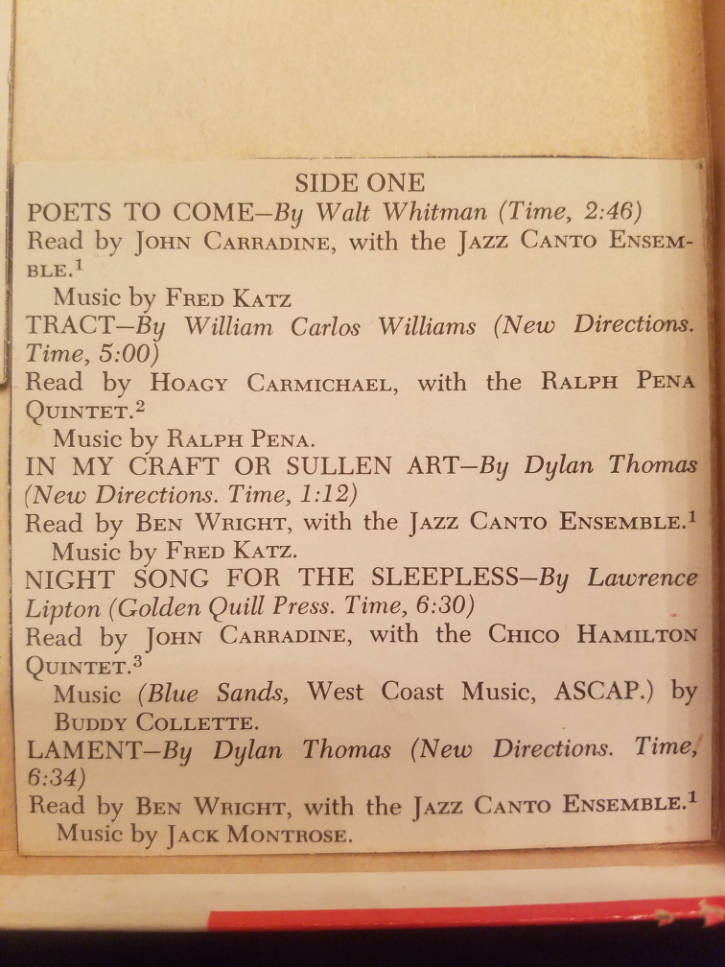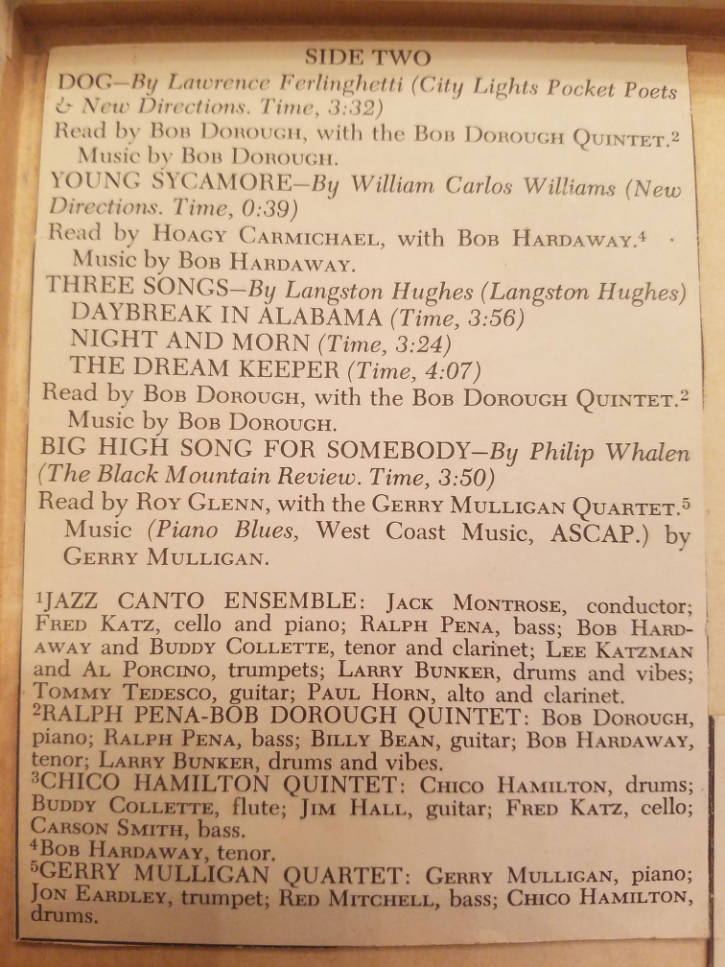Tape 188: Buddy Collette; Poetry jazz session, 1957 July 31
1 media/high-volume.png 2019-07-18T12:32:08-07:00 Curtis Fletcher 3225f3b99ebb95ebd811595627293f68f680673e 34610 4 Tape 188) Buddy Collette; Poetry jazz session: "Dick, this poet, sits at a piano" (0:06, 1:48, 4:49) with music, 1957 July 31. -- TIMES indicate where sections begin. plain 2020-06-26T14:23:23-07:00 Lawrence Lipton Papers, USC Digital Library 7/31/57 Collette, Buddy, speaker Bo Doub 59bddb0b27f7b3138b6b5c39e4cc435e9208ebadThis page has tags:
- 1 2019-08-07T11:19:41-07:00 Curtis Fletcher 3225f3b99ebb95ebd811595627293f68f680673e Lipton and Jazz Curtis Fletcher 2 Lorem ipsum dolor sit amet, consectetur adipiscing elit. Quisque lorem neque, lacinia at tincidunt in, iaculis sed lorem. In ac velit convallis, lacinia ante at, venenatis mi. plain 2019-08-07T11:24:31-07:00 Curtis Fletcher 3225f3b99ebb95ebd811595627293f68f680673e
This page is referenced by:
-
1
media/Venice-West-Cafe-exterior-CROP.jpg
2019-07-27T14:07:17-07:00
Audio Collection
67
Browse all the Audio in this Exhibit
image_header
2019-08-10T11:51:26-07:00
Below is a collection of all audio clips included in this exhibit.
To view and access timestamps for each clip, click on "Annotations" below each audio player. To collapse the annotations for a clip, click on "Description."
To see where, in this exhibit, a given audio clip appears, click on "Citations."
Introduction
Lawrence Lipton, the Beat Generation in Venice West, and the Lawrence Lipton papers at USC.
Lipton and the Beat Generation Poets
Lipton’s interviews with or about Beat poets, featuring Stuart Perkoff, Kenneth Rexroth, Lawrence Ferlinghetti, and others.
Lipton and Venice
The Venice West Picture Essay, the Gas House, and the history of Venice.
Lipton and Jazz
Jazz Canto, Langston Hughes, and Lipton’s recordings of poetry jazz sessions.
-
1
2019-07-17T20:27:44-07:00
Lipton and Jazz
24
Jazz Canto, Langston Hughes, and Lipton’s recordings of poetry jazz sessions.
plain
2019-08-10T11:50:23-07:00
The poets and musicians of Venice West dedicated considerable efforts toward combining poetry and jazz. In The Holy Barbarians, Lipton grouped these efforts as "part of the growing revival of the oral tradition and, in poetry, a part of the bardic tradition."[2] In 1958, a year before The Holy Barbarians was published, Lipton and jazz photographer William Claxton co-produced an LP record: Jazz Canto: Vol. I, An Anthology of Poetry and Jazz, published by World Pacific Records.Poetry and jazz—or Jazz Canto, as I prefer to call it—will not be a viable art form until it solves its problems and becomes a part of the standard repertoire of public performance. Nor should it be limited to jazz music. In Jazz Canto several types of music are employed besides jazz. Whatever music is suitable to the poem is the right music. When poets learn more about music and musicians learn more about poetry it will be easier to make progress with this new idiom. To this end I have been laying the foundations for a Jazz Canto Workshop where poets will be required to learn how to read music, play at least one instrument, and take voice lessons in order to learn how to use the voice box for the public rendition of their poetry.[1]
Each track on Jazz Canto is jointly authored by (i) the poet who wrote the poem, (ii) the "interpreter" who reads the poem aloud, and (iii) the musicians who compose and perform the accompanying jazz melodies using various instruments. The source material featured on the record comes from poets Walt Whitman, Dylan Thomas, William Carlos Williams, Langston Hughes, Lawrence Lipton, Philip Whalen, and Lawrence Ferlinghetti. The interpreters reading the poems are John Carradine, Hoagy Carmichael, Ben Wright, Roy Glenn, and Bob Dorough. Finally, the composers of Jazz Canto include Gerry Mulligan, Chico Hamilton, Fred Katz, and Jack Montrose.
Listen to the full Jazz Canto album, transferred from the commercial 33⅓-rpm record, at the USC Digital Library (also below with the track lists as they appear on Lipton's tapes).

The Beats of Venice West did not invent jazz poetry. Langston Hughes was writing, performing, and publishing jazz poetry in the 1920s during the Harlem Renaissance. Moreover, Hughes was working from preceding influences of "dialect poetry" by earlier poets, such as Paul Laurence Dunbar's late 19th century works built on Black speech rhythms of the rural South.[3]
Tape 185 of Lipton's collection records Langston Hughes and Lawrence Lipton reading their poetry with "pure jazz improvisation" in Lipton's Venice home in 1958. Tape 185 also features Bob Dorough and Saul White playing keyboard and percussion to the spoken words of Lipton and Hughes.
A few of Lipton’s tapes are labeled "Poetry jazz session" with further details listing musicians, places, and dates. Tape 188 includes a 1957 session with Buddy Collette. Other jazz musicians featured on Lipton's tapes include Dave Brubeck, Jimmy Alonze, Shelly Manne, Ralph Peña, Lee Katzman, Larry Bunker, and Tommy Tedesco.